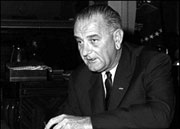 |
| President Johnson: "Let
us close the springs of racial poison" |
| 1964: President Johnson signs Civil Rights
Bill |
England have
The Civil Rights Bill - one of the most important piece of legislation
in American history - has become law.
US President Lyndon B Johnson
signed the bill creating equal rights in voting, education, public
accommodations, union membership and in federally assisted programmes -
regardless of race, colour, religion or national origin.
The bill has caused much controversy since it was introduced last year
by President John F Kennedy.
It was signed tonight in the White House five hours after the House of
Representatives passed it by 289 to 126 votes.
After the signing, President Johnson shook hands with civil rights
leader Dr Martin Luther King.
In a television address to the nation he called on US citizens to
"eliminate the last vestiges
of injustice in America".
"Let us close the springs of racial poison," he said.
'Monstrous oppression'
Parts of the bill take immediate effect, including the "public
accommodations" element which means black people can no longer be excluded
from restaurants, hotels, bars, cinemas, sports stadia and other public
facilities.
Sections on voting rights and desegregation of schools are also
enforceable from now and give the Attorney General more power to intervene
where necessary.
The section on equal opportunity in employment will not begin to
operate for another year and will not be fully effective for five years.
During the debate on the bill, segregationist politicians from
America's deep south expressed their disappointment and anger.
Congressman Howard Smith of Virginia called it a "monstrous oppression
of the people".
Civil rights activists have welcomed the new law. Roy Wilkins,
secretary of the National Association for the Advancement of Coloured
People described it as "the Magna Carta of human rights".
He applauded the appointment of former governor of Florida Leroy
Collins as director of the new Community Relations Service, set up to deal
with issues arising from the desegregation of public facilities and
institutions.
The Civil Rights Commission has announced a campaign to implement the
law.
And Dr King said he would be seeking commitments from businesses and
community leaders all over the south to respect the new law under a
campaign called Operation Dialogue.